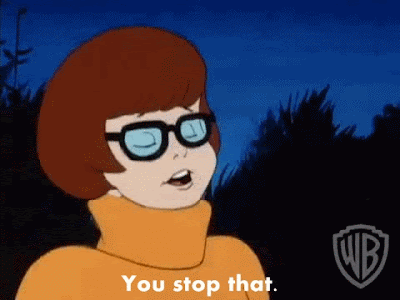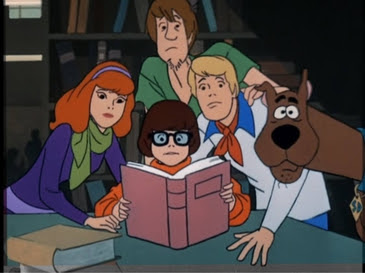In case you haven’t heard, Velma Dinkley is officially a lesbian. At least, that’s what I read in Variety not long ago.
I’m not certain how that happened – Velma has been around since 1969 and her sexuality was never referenced in her adventures. But now, more than 50 years after she was introduced in the first episode of Scooby-Doo, Where Are You? someone who had nothing to do with her creation made a decision to the contrary, that has been celebrated in news stories with headlines like “Finally Confirmed” and “Officially Gay.”
And my response is, why?
The usual answer when these things happen is “inclusion” or “representation.” But when characters that have existed in one way for decades are suddenly altered to fit an agenda, I don’t understand how that constitutes an achievement. The people doing this have been supplied with the character and the story, which were created by other (usually more talented) artists. All the heavy lifting has already been done for them. Their sole contribution is to change one inherent characteristic of that character – and for this they are lionized for boldness and cultural advancement?
Can anybody do this? If I were to produce an adaptation of Arthur Conan Doyle’s The Hound of the Baskervilles, but in my version Sherlock Holmes is from Uruguay, will they build a statue of me in Montevideo?
Here’s what the folks behind this new series, entitled simply Velma, could have done that would be worthy of admiration. Create a new group of characters, give them whatever traits they’d like, establish them within their fictional world, and then tell stories that viewers find entertaining enough to want to see more. That takes creativity, and originality, and talent. And with 500 channels and streaming services hungry for fresh material, they have more opportunity than ever before to get their project in front of an audience.
But I guess that was too much work. Instead, they wanted to capitalize off the name recognition that comes with an established franchise, while feeling no responsibility to make their version recognizable to those who looked forward to getting reacquainted with beloved characters.
Such projects are nothing but exercises in hubris: “Celebrate me – look how I’ve updated a property with its roots in patriarchy and white privilege and intolerance of alternate lifestyles, and made it better for everyone!”
But if they are really better, why do they never achieve the same level of popularity? Does anyone doubt that 50 years from now, children will still be enjoying the original Scooby-Doo cartoons, while this Velma vanity project will have been long forgotten?
Whether anyone will admit it or not, once a character has been established in the popular culture, the majority of fans do not want to see that character changed, regardless of the reasons behind it.
Over the past 30 years I’ve interviewed dozens of actors who worked on television shows. When they discussed the characters they played, all of them explained how, at a certain point, the character takes on a life of his or her own. Writers, directors, actors and costume designers all contribute something to that process, but then something happens beyond that, a remarkable alchemy in which the character begins to direct his or her own fate.
In a first-season episode of Charlie’s Angels, Jaclyn Smith received a script that suggested Kelly Garrett, who viewers already knew had been an orphan with a difficult childhood, might have done some street hustling to survive. She insisted the reference be removed because “Kelly wouldn’t do that.” And it was removed. Someone was looking out for her, and trying to preserve her reputation.
Sadly, no one is playing a similar role for this project – or any others, from what I’ve seen. Changes such as the one instituted here will be applauded, and those who disagree will be rebuked with the usual accusations of intolerance.
But wait, you say, this isn’t the first time someone intimated that Velma was gay.
Fan theories have been circulating for decades; and that’s fine, because people should be allowed to have opinions about everything without being shunned or prosecuted for them (that used to be the case in America). But if you’ve ever waded into the murky waters of fan fiction you’ll soon discover how much of it is fixated on sex, and particularly sex between heterosexual characters, from Kirk and Spock to Starsky and Hutch. I guess everyone needs a hobby.
What fans choose to project onto characters is their business. But when a beloved franchise is revived, especially with claims of being “official,” I think there should be some responsibility to do it right. And this is not right, because Velma is not gay. She is not straight either. She’s not anyone’s symbol or standard-bearer. She’s just Velma – a girl who likes to help her friends solve mysteries. And until recently, that was enough.





Nicely said David, and I couldn't agree more. This reminds me of when Peppermint Patty was "outed" a couple years back (along with her friend Marcy) and I thought wait a minute, when I was a kid I knew a few girls who were tomboys, one of them being my sister who grew up to be happily married to a man and didn't Patty have a crush of sorts on "Chuck" anyway? I just don't see the need to sexually tag these cartoon characters either, c'mon!
ReplyDeletePS. So glad to see the original banner back! 🙂👍👍👍👍
ReplyDeleteYou and me both, my friend!
DeleteMr. Hofstede, you MIGHT want to watch a certain YouTube short featuring conservative commentator Matt Walsh and a certain scene from the recent "Muppet Babies" reboot. Yes, the short in question is relevant to this Comfort TV commentary.
ReplyDeletehttps://www.youtube.com/shorts/YttbstSn1a8
Isn't it interesting that the group of people (progressive elitist) who are so set on educating us about not judging folks by their looks are the first ones to judge folks by their looks?
ReplyDeleteSpeaking of "Starsky & Hutch," Huggy Bear was never supposed to be a pimp, was he? Mr. Hofstede, have you seen David Soul's 1977 telefilm "Little Ladies of the Night"?
ReplyDeleteHuggy's sources of income were many and varied and not always legal from what I recall. Though I'm revisiting that series now. I did not see the Soul film you mentioned.
DeleteWell said as always, David!
ReplyDeleteI think the confusion here might possibly stem from the old rumor that the Scooby gang was supposed to be based on the cast of "Dobie Gillis" and that Velma represented Zelda Gilroy. Many years later, the real Zelda, Sheila James Kuehl, came out as a lesbian and since she reminded many fans of Velma, that could be where people got the idea that Velma was gay as well. So now the new cartoon series is trying to make it official and have the viewers believe that it's true. Sorry, but I'm not buying it. If that isn't bad enough to make both Hanna and Barbera spin in their graves, then there is also the new cartoon series "Jellystone" which takes a few of their beloved male characters like Augie Doggie and Jabberjaw and turns them into females! This is for the sake of gender equality since there weren't enough females in the HB Zoo! Another victory for the Woke Generation who wouldn't know a good cartoon from a hole in the ground. I find all this to be very sad.
ReplyDeleteHmmm, I was thinking of going in the other direction with this analogy. Since the kids on "Buffy the Vampire Slayer" referred to themselves as "the Scooby gang", and the second banana female character Willow was turned lesbian in later seasons, I'd wondered if that had an influence on this.
DeleteThere is already backlash concerning the upcoming Disney+ series "X-Men '97." To understand what I'm getting at, check out the following URL:
ReplyDeletehttps://www.forbes.com/sites/caileygleeson/2024/02/16/x-men-fans-push-back-against-anger-over-non-binary-character/?sh=73f2f5db72df
Mr. Hofstede, remember when Keshia Knight Pulliam appeared in the 1989 Disney telefilm "Polly"? It was compared unfavorably to Hayley Mills's 1960 big-screen movie "Pollyanna." When you get a chance, Mr. Hofstede, you might want to read Hal Erickson's review of "Polly." To get to it, go to the following URL:
ReplyDeletehttps://www.allmovie.com/movie/polly-vm1075824